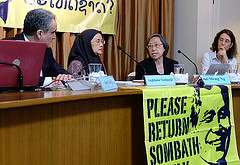Wednesday July 13, 2005, Guardian
The Gleneagles aid package may have hit the right notes with Bob Geldof. But others are not so sure, says Rachel Shabi
Sir Bob Geldof cited it as a great day for Africa. "On aid, 10 out of 10; on debt, eight out of 10," he said. Tony Blair said that "great progress had been made", and Hilary Benn, the international development secretary, said this was politics "showing it could make a difference".
But global justice campaigners, to the intense annoyance of the government, had far less favourable scorecards on the aid, trade and debt package from Gleneagles. To the intense annoyance of Blair, who accused them of "not getting their hands dirty by trying to achieve anything", the majority of development groups in the Make Poverty History (MPH) coalition were, at best, underwhelmed. "We have to reflect on whether it [MPH] really did create the kind of political pressure we think is necessary", said Peter Hardstaff, head of policy at the World Development Movement.
John Hilary, director of campaigns and policy at War on Want, a member of the coalition, said: "The G8 has given less than 10% of our demand on debt cancellation and not even a fifth of what we called for on aid." The pledged $50bn uplift in annual aid, said others, amounted to just $20bn in new aid – and even that just on the basis of vague "commitments" to development assistance. And on trade, said War on Want, the G8 actually hardened its stance, "forcing more countries to open their markets, and threatening millions with the misery of poverty. Geldof may be content with crumbs from the G8 table. But we did not go to Gleneagles as beggars. We went to demand justice for the world’s poor."
Differences of opinion within the MPH campaign, a coalition of development NGOs spearheaded by Geldof, Bono and Midge Ure, were highlighted in the last edition of Red Pepper magazine, which suggested some groups were angry at how the campaign’s core messages on trade, aid and debt had been diluted by "white bands, celebrity luvvies and praise upon praise for Blair and Brown". However, Adrian Lovett, one of the co-ordinators of MPH and campaigns director at Oxfam, said: "I would challenge the sense that Make Poverty History has not taken a radical approach. The whole emphasis has been that this is not about charity, but justice… Make Poverty History is a coalition," he added. "There are different forces at play."
The MPH coalition changed the timbre of the main G8 summit protests this year, said some. Waldon Bello, director of leading southern NGO Focus on the Global South, said of the 250,000-strong MPH march in Edinburgh on July 2: "This was a very different mood from previous G8 counter-mobilisation. Here, it was, ‘Let’s work with the G8’, and a rather mellow atmosphere, while other mobilisations have been more confrontational, with a sense the G8 was part of the problem."
Bello did not see the people who marched on Edinburgh as being less radical than those at, say, the Genoa G8 summit in 2001. Instead, he argued, it was the MPH leadership that chose not to radicalise the event. "There was an underestimation of the political consciousness of people at that march," he said. Various MPH heads reportedly winced at Bello’s speech at the Edinburgh MPH rally, during which he linked poverty to war and the policies of the G8. The audience, however, seemed to lap it up.
Some protesters against the G8 were also infuriated by MPH campaigning methods, described by the head of one NGO, who asked to remain anonymous, as "a total betrayal of the social justice movement". The trouble, he went on, was that the MPH message "focused on the symptoms, not the causes of poverty – the causes being, to a large degree, instigated by organisations like the G8 and IMF".
MPH drew 250,000 people on to the streets of Edinburgh, while 360,000 of its supporters emailed Blair on the subject of eradicating poverty, and 9.3 million people in the UK bought white MPH wristbands. "If these millions of ordinary people are serious about this cause, they are going to find themselves involved in a more substantial, long-term movement with a more substantial and fundamental critique of the global economic system," said Brian Ashley, of Jubilee South.
Other NGOs, especially those that were part of the MPH coalition, now say they will step up the political analysis. "We are about to see a more radical stage in the movement – not something that these same pop stars would want to be involved in," said the head of one organisation.
"This experience was a good lesson for us," said Bello. "Never again should we allow ourselves to be co-opted in this way."
Copy right: Guardian Unlimited Guardian Newspapers Limited 2005







